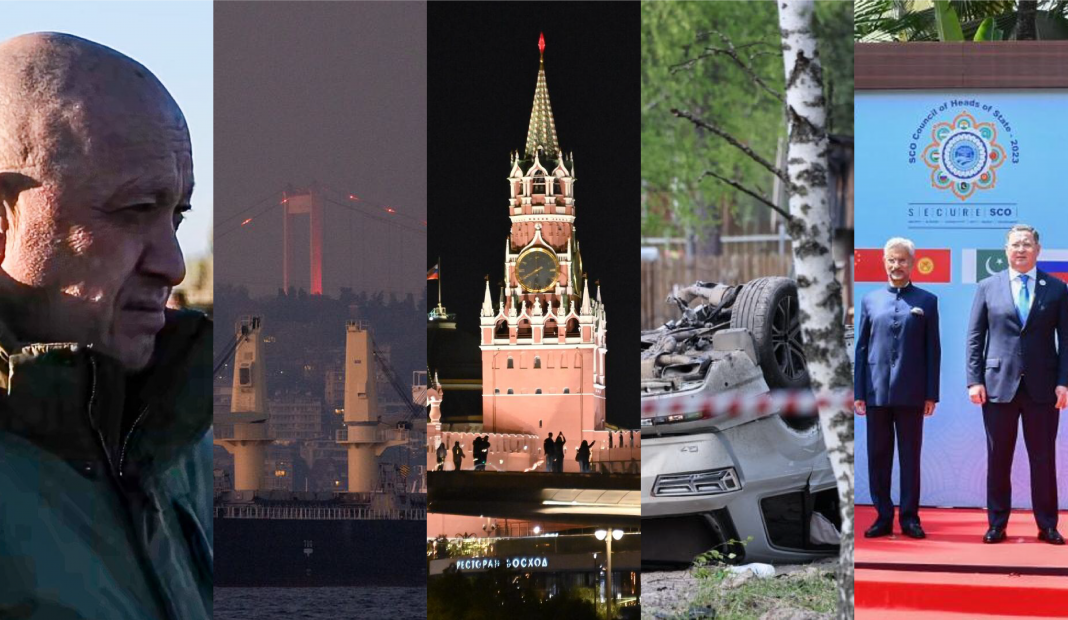This report describes the key events that significantly impacted Russia’s political, economic and social processes.
Based on the results of the past week, the following trends can be summarised:
- Russia is plunging deeper into the pre-election process, bringing political technologies to the fore. The essential news of the outgoing week, whether it was Prigozhin’s “demarche”, the UAV attack on the Kremlin or the undermining of Prilepin, should first be considered in the context of political technologies and the formation of a new political reality in Russia. The most important note in this situation is that the Kremlin controls all such processes and cannot be considered a potential threat factor.
- Moscow is preparing for a gradual transition to a peaceful settlement of the Ukrainian issue. The most likely option for such a format is the increased participation of China and several states that have joined it. Important initiatives are expected to be announced during the SCO summit scheduled for June 24-25. At the same time, the intensification of Russian missile attacks on the territory of Ukraine speaks of an attempt to put forward ultimatums against the backdrop of increased talk about the imminent start of a counteroffensive by the Ukrainian Armed Forces.
- Lately, a noticeable information lull has been on Putin’s part. Over the past week, the Russian president has practically not been engaged in foreign policy, concentrating on meetings with several governors and other government officials. Moreover, he spent almost the entire week in Sochi. In this place, he regularly comes for treatment or preventive procedures (apparently, shortly, we should expect the publication of new investigations by Russian “oppositionists” about a severe deterioration of Putin’s health). At the same time, Putin’s silence should also be considered as part of the technology, the primary purpose of which is to demonstrate the impotence of the Russian president in the face of current challenges (first of all, we are talking about the conflict among the military and the UAV attack on the Kremlin).
This digest addresses the following issues that were most relevant for Russia during the period from May 1 to May 7:
- Meeting of the Council of Ministers of Foreign Affairs of the member states of the Shanghai Cooperation Organization.
- Discussion of the extension of the Black Sea Grain Initiative.
- “Intensification” of the “conflict” between Evgeny Prigogin and the Russian Defense Ministry.
- UAV attacks Kremlin.
- Explosion of the car of Russian politician and writer Zakhar Prilepin.
- Interview of the Secretary of the Security Council of the Russian Federation Nikolai Patrushev to the publication “Izvestia”.
This Content Is Only For Subscribers
- Meeting of the Council of Foreign Ministers of the Member States of the Shanghai Cooperation Organisation
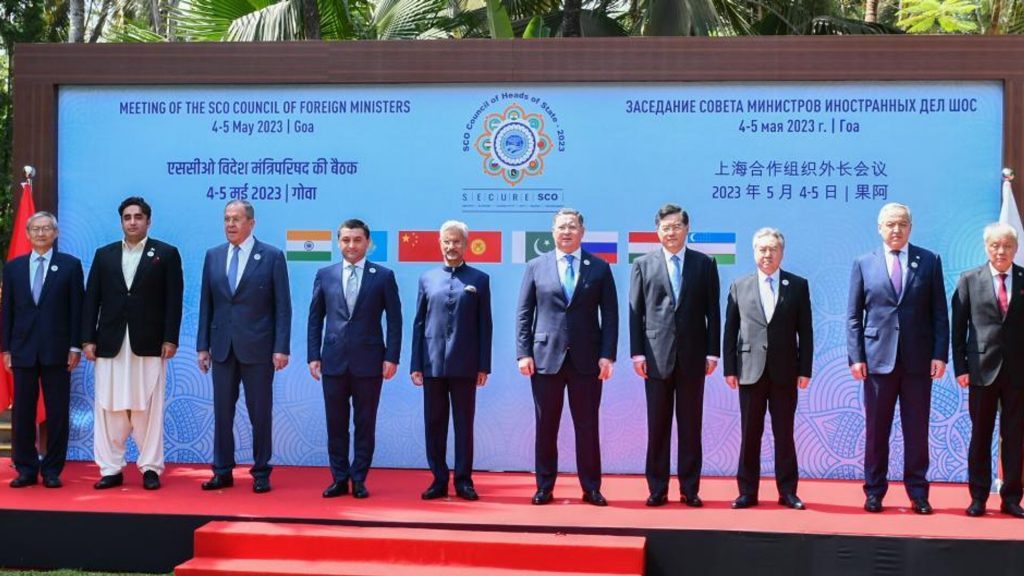
On Thursday, May 4, in the Indian city of Panaji, Goa, a two-day summit of the foreign ministers of the SCO member states began. The main topic of the meeting was the issue of expanding the organisation, as well as the consideration of several proposals within the framework of the SCO. Iran is expected to become a full member of the organisation at the upcoming summit of leaders of the SCO member states. The procedures necessary for the admission of Belarus are actively underway. Bahrain, Kuwait, Maldives, Myanmar and the United Arab Emirates are joining the interaction within the organisation as new dialogue partners.
Outcomes and outlook:
Today, the Shanghai Cooperation Organization has become a club of states openly challenging the monopolar world. At present, the total territory of the countries belonging to the SCO is more than 35 million km², that is, 65% of the territory of Eurasia. The total population of the SCO countries is approximately equal to half of the world’s population (more than 3.5 billion). China and India, which are members of the SCO, hold the positions of the second and third economies in the world. Russia, China, India and Iran are members of the “space club”. At the same time, the organisation demonstrates a tendency to expand by entering new members (UAE, Egypt, Belarus and others).
It is also important to note that the SCO is not a military bloc, which in the future can be used in a diplomatic confrontation with NATO: in fact, most of the member states of the “anti-Western coalition” demonstrate an attempt to create a peaceful organisation that focuses on economic, humanitarian and cultural aspects, and not in service and expansion. An example of the development of such a scenario is Lavrov’s call to the leaders of the countries of the Shanghai Cooperation Organisation to create their own sports association. According to him, this will simultaneously expand the functionality of the SCO, as well as “cope with the almost monopoly influence of the West in sports.”
Iran’s membership in the SCO was a matter of time (like Belarus) – especially after India and Pakistan joined the group of Central Asian states, Russia and China. However, the predicted expansion of the SCO, not only at the expense of Iran but also at the expense of a group of Arab states, as well as (which is especially important) Myanmar, brings the SCO to a new level. True, with this expansion, Russia begins to play an ever less important role, and China will occupy the leading position in this association. But objectively, Russia cannot claim leadership in the SCO – its economic weight is too low to act as a unifier. That is why Russia will use the expansion of the SCO only for propaganda purposes – “our regiment has arrived.” But it will gradually become clear that the original task of uniting the countries of the Central Asian region around the Moscow-Beijing axis has become obsolete, and Russia itself is becoming one of the elements of the pan-Chinese system. The main task of the SCO shortly will be to search for models to avoid confrontation between China and India. (and at the same time between India and Pakistan). Under these conditions, Russia within the SCO turns into an extra.
It is also worth paying attention to the statements of the SCO Secretary-General Zhang Ming, who noted that “the countries of the Shanghai Cooperation Organisation (SCO) are ready to create favourable conditions for resolving the Ukrainian crisis”: “The SCO member countries unite based on common values and share the same or close positions on many important international and regional issues, he noted.
In this context, it is worth noting that, according to Ascolta, during the meeting of the heads of foreign affairs departments of the SCO member states, special attention was paid to the issue of putting forward an initiative to resolve the situation in Ukraine, which should be announced in June, at the summit of leaders of the SCO member states (scheduled June 24-25 in New Delhi). If such an idea is successfully implemented, the world community will be offered a precedent in which a conditional “anti-Western coalition” will try to demonstrate a more successful approach to the peaceful settlement of the conflict.
- Discussion of the extension of the Black Sea Grain Initiative
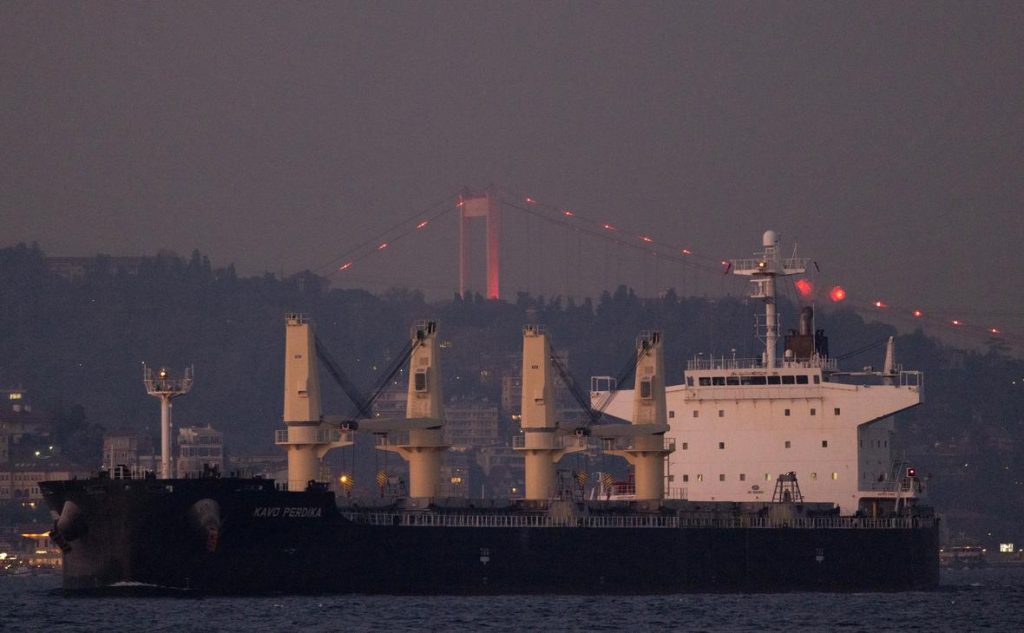
Extending the Black Sea Grain Initiative is being increasingly discussed in public and non-public spaces. In the last digest, Ascolta also analysed the events around the so-called “Grain Deal”, but during the week, several important statements were made that opened the curtain, demonstrating the natural mood of the negotiators. The term of the previous agreements expires on May 18, forcing the parties to look for quick solutions to meet the interests of all parties.
Timeline:
- On Thursday, May 4, it became known that the previously scheduled four-party meeting of deputy defence ministers was cancelled and could occur next week.
- On May 5, at the initiative of Turkey, technical negotiations were held in Istanbul between representatives of Russia, Ukraine, Turkey and the UN.
- Several media outlets have stated that the subject of technical negotiations will include the resumption of exports of Russian ammonia through Ukraine via the Togliatti-Odesa ammonia pipeline.
- On the same day, the British edition of The Guardian, citing UN Deputy Spokesman Farhan Haq, said that the next round of negotiations had reached an impasse.
- On Saturday, May 6, Russian Deputy Foreign Minister Sergei Vershinin confirmed that a high-level four-party meeting on extending the grain deal would be held soon.
Outcomes and outlook:
A week before the end of the “grain deal”, Russia not only put forward more and more specific and difficult conditions but also early demonstrated the possible consequences of its non-extension: regular rocket attacks on the Odesa and Mykolaiv regions, including the port infrastructure, demonstrate Moscow’s readiness to violate previously reached agreements and expand the front to the south. According to Ascolta, shortly, it is planned to strengthen the topic of Transnistria by putting forward specific initiatives to expand the Russian contingent in the unrecognised state.
At the same time, for Moscow, the issue of extending the “grain deal” is still relevant. But first, we are talking about the resumption of the operation of the Togliatti-Odessa ammonia pipeline, around which the main discussions are currently underway.
At the same time, as Ascolta wrote earlier, for Moscow, the issue of extending the “grain deal” is primarily a political issue. In particular, the closing date for grain corridors is indicative – May 18, that is, a few days after the presidential elections in Turki. Russia is trying to use the “grain deal” as an incentive in negotiations with both the current Turkish President, Recep Erdogan, and his primary opponent Kemal Kılıçdaroğlu. In this way, Russia is trying to play it safe and create advantageous positions both in the event of Erdogan’s victory, and the event of Kılıçdaroğlu came to power. Both politicians say that the deal is essential and necessary for Turkiye, and both insist on maintaining partnership relations with Russia. Still, Moscow would like to have guarantees and the opportunity to influence the further steps of both Erdogan and Kılıçdaroğlu. That is why the Grain Deal is stalling, and progress on the issue of its re-signing is possible only after the first round of the presidential elections, that is, after May 14.
At the same time, the less active participation of Western states in the discussion of the issue of extending the “grain deal” also indicates a partial de-actualisation of this issue. The sharp rejection of the theses about starving Africa was caused by several scandals within the EU, which appeared against the backdrop of increased grain exports from Ukraine, which went along the grain corridor.
In this situation, it should be assumed that the announced high-level meeting to discuss extending the “grain deal” will still take place in the coming days, but its effectiveness is still open.
- “Intensification” of the “conflict” between Evgeny Prigogin and the Russian Defense Ministry
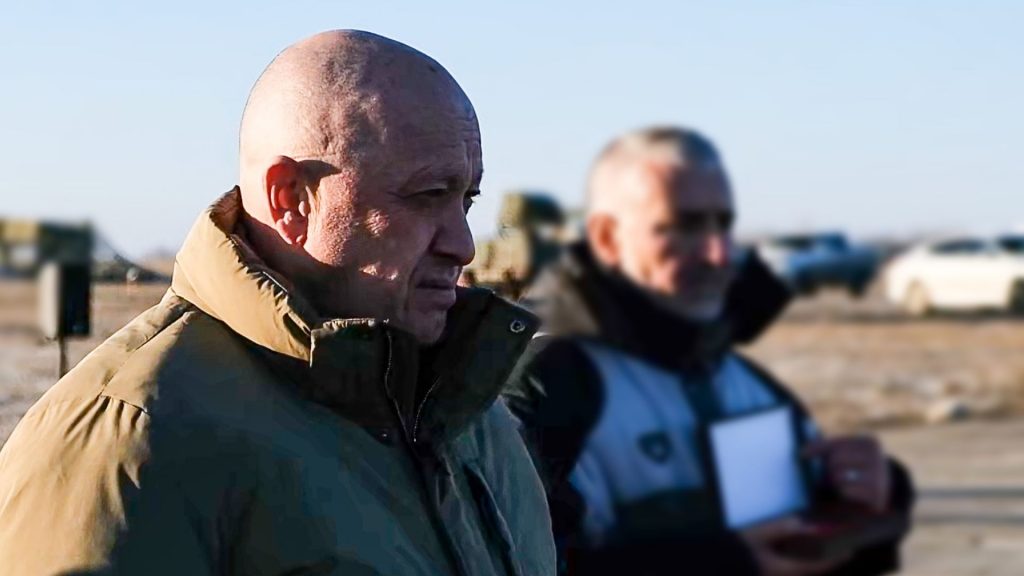
On Friday, May 5, the curator of PMC “Wagner” issued another statement in which he accused the Minister of Defense of the Russian Federation, Sergei Shoigu and the Chief of the General Staff of the Russian Defense Ministry of purposefully restricting the supply of ammunition for PMC fighters in Bakhmut, as a result of which losses among the personal composition of Wagner. Prigozhin also said that on May 10, he would completely withdraw the Wagner PMC mercenaries from their positions in Bakhmut and hand them over to the troops of the Russian Defense Ministry. This statement caused heated discussions and gave rise to many theories. At the same time, by the end of the week, Yevgeny Prigozhin announced that the issue of ammunition had been resolved, and his fighters would remain in their positions.
Timeline:
- On Friday, May 5, Prigozhin published a video with the corpses of “Wagnerites” and blamed Shoigu and Gerasimov for their deaths.
- In a later statement, Prigozhin stated that his mercenaries would go to rear camps to “lick their wounds”.
- Putin’s spokesman Dmitry Peskov noted that the Kremlin had seen Prigozhin’s statement but would leave it without comment for now: “I can’t comment on it because it concerns the course of a ‘special military operation’,” Peskov said.
- On the same day, Prigozhin’s statement was commented on by the Head of Chechnya, Ramzan Kadyrov. He stated that the Akhmat special forces are ready to replace the Wagner PMC in Bakhmut if the latter withdraws its units: “If the scenario is still like this, then our fighters are already ready to advance and occupy the city. It is a matter of a few hours,” Kadyrov said. At the same time, he called Prigozhin’s decision to withdraw PMCs from Bakhmut “unpleasant.”
- On Saturday, May 6, Yevgeny Prigozhin published a letter to Shoigu asking him to transfer the Wagner PMC positions in Bakhmut to Ramzan Kadyrov’s Akhmat unit from May 10.
- Following Prigozhin, Kadyrov’s appeal appeared. But, he stated, “he also wrote a letter to the Supreme Commander-in-Chief that we are ready to take Bakhmut and the rest of the territory.”
- Sometime later, Kadyrov issued a new appeal, calling on the “Wagnerites” to join the Akhmat battalion, which could replace the Wagner PMC in Bakhmut. In addition, he promised Prigozhin’s mercenaries “better conditions” than they have now.
- Kadyrov also published a post on his Telegram channel criticising Prigozhin’s decision: “I’m offended that my brother behaves like this. Because all of us were made human by one person – Vladimir Vladimirovich Putin, so we owe him our lives. He stated that Prigozhin refused to “go to the last battle”, evading the assault on the last two square kilometres of Bakhmut territory: “For you, these 2×2 kilometres turned out to be more difficult than 90%.”
- Later, Kadyrov published a letter to Putin asking to remove the Akhmat battalion from other directions and transfer it to Bakhmut at the positions of the Wagner PMC.
- On Sunday, May 7, Yevgeny Prigozhin announced that the PMC “Wagner” remained to fight in Bakhmut: “As much ammunition and weapons as we need to continue further actions, they swear to us that everything will be put up on the flank, which is necessary so that the enemy does not cut us off, we are told that we can act in Bakhmut as we see fit, and we are given Surovikin as a person who will make all decisions in the framework of the military operations of the Wagner PMC on interaction with the Ministry of Defense.”
Outcomes and outlook:
Despite the active media discussion of Prigozhin’s actions and statements, it is important to note several key factors that often remain behind the scenes. First, as Ascolta has repeatedly written, Prigozhin is a controlled political technology. Such activity of Prigozhin would hardly have been possible if the Presidential Administration had not commanded the media to assist “Putin’s cook” in every possible way. Rumours about his game against Putin are also part of the technology and do not give reason to expect to create a threat to the current political regime in Russia.
Secondly, Yevgeny Prigozhin is increasingly becoming a political figure, which foresees high media coverage. Prigozhin is positioned as one of the leaders of the “party of war”, “hawks” in Russian politics. According to Ascolta, he is destined for a particular role during the upcoming presidential elections in 2024: the fact that Prigozhin had all the media of the Russian Federation at his disposal (reliably controlled and moderated by the authorities) shows that the “conflict” is ostentatious, simulated. In essence, Prigozhin acts as a trigger, playing on the side of the Kovalchuk group against their enemy Shoigu. If before the start of the war against Ukraine, Shoigu and Kovalchuk got along as part of a single team, now we are talking about large defence orders, budgets, big money and influence, forcing them to wage a fierce struggle. Prigozhin’s message is directed specifically against Shoigu, just like Ramzan Kadyrov’s “response” (the Prigozhin-Kadyrov tandem began to form back in 2022, and last week, precisely on the eve of Prigozhin’s and Kadyrov’s high-profile statements, the leader of Chechnya received the Kurchatov medal – an award, the presentation of which is supervised by the elder Kovalchuk, Mikhail).
Thirdly, the activities of any PMC, according to Russian law, remain outside the law. In this case, their silence Putin is logical as he cannot officially comment on what is happening in that part of the troops, which, according to the criminal code of the Russian Federation, are a terrorist organisation. At the same time, the very existence of such groups, with virtually unlimited technical, military and media capabilities, suggests that a fundamental conflict between Prigogine and Putin is impossible.
Fourthly, an essential element of the production with the participation of Prigozhin should be recognised, under loud statements, the almost unnoticed appointment of Colonel-General Mikhail Mizintsev, nicknamed “Mariupol Butcher”, who, as Deputy Minister of Defense of the Russian Federation, oversaw the material and technical support of the Armed Forces until April 27, 2023. That is, Prigozhin raises a cry that there are not enough shells and, at the same time, coordinates the person for the position of deputy of the Wagner PMC, because of which he does not have enough bullets. Most likely, we are talking about the unification under the wing of Prigozhin, a group of generals who are hostile towards Shoigu.
It is clear that the PMC “Wagner” will not leave Bakhmut, but we can expect:
The strengthening of the “Wagnerites” at the expense of Kadyrov’s Chechen fighters.
Attempts to turn the tide and take by storm a small part of Bakhmut, which remains under the control of the Armed Forces of Ukraine (until May 9 or 10 – it is no coincidence that Prigozhin set a deadline of May 10 in a request).
Increased information pressure on Sergei Shoigu – and simultaneously pushing Putin to decide to replace Shoigu with another figure).
For Putin himself, this situation also has favourable moments. First of all, the presence of a conflict within the military bloc gives confidence that the military will not join forces in an attempt to overthrow the government.
- UAV attacks Kremlin
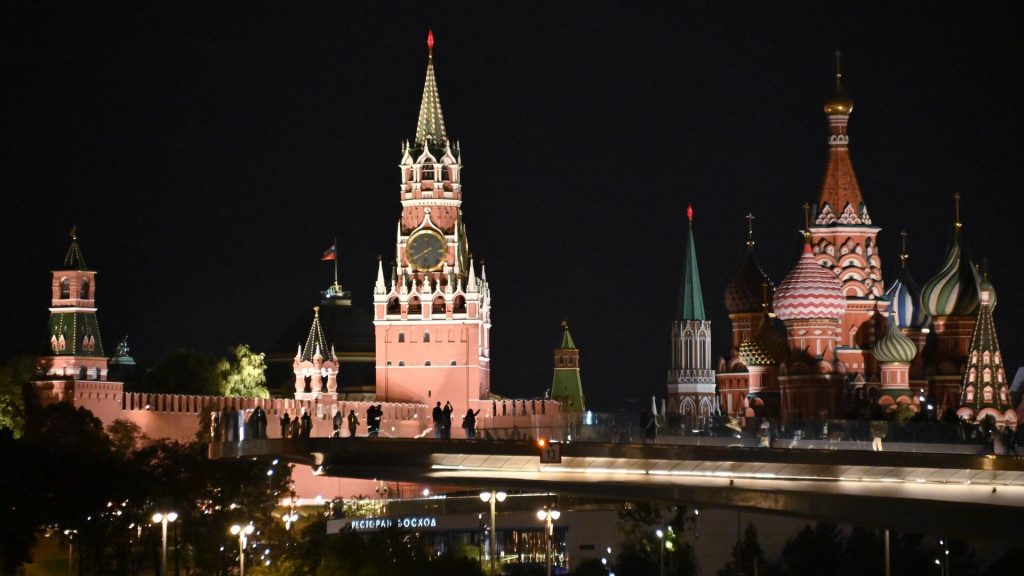
On Wednesday, May 3, an attempt was made to strike by unmanned aerial vehicles on the Kremlin residence of the President of the Russian Federation. Later, several Russian media stated that as a result of timely actions taken by the military and special services using radar warfare systems, the devices were disabled, and as a result of their fall and scattering of fragments of the victims and material damage. Sometime later, videos appeared on the network that clearly showed the flight of a UAV and an explosion over the dome of the Senate Palace in the Kremlin.
Timeline:
- Almost immediately, Russia blamed Ukraine for the drone attack on the Kremlin and called the attack an “assassination attempt on Putin”: “This is a planned terrorist attack, an attempt on the Russian president,” the Kremlin said.
- “The Russian side reserves the right to take retaliatory measures where and when it sees fit,” Putin’s spokesman Dmitry Peskov said.
- On the same day, there were several hints about the need to use nuclear weapons. Thus, General Alexander Fomin, deputy head of the Russian Defense Ministry, said, “Russia’s activities in the field of nuclear deterrence are defensive in nature and aimed at protecting sovereignty,” hinting at the possibility of considering such an option after the UAV attack.
- Deputy head of the Security Council of the Russian Federation Dmitry Medvedev called for the assassination of Vladimir Zelensky: “After today’s terrorist attack, there are no options left but to intimidate Zelensky and his clique physically. It is not even needed to sign the act of unconditional surrender. Hitler, as you know, did not sign it either. Therefore, there will always be some kind of replacement like the Zitz-President Admiral Dönitz.
- At the same time, the head of the Servant of the People faction, David Arakhamia, expressed his opinion on the situation with the UAV: “I will express my personal opinion based on a series of insiders. The attack on the Kremlin was carried out on the collective order of the Russian oligarchs, who fell under sanctions because of the Putin regime. This is the first collective game of the “offended club”. Hopefully, not the last.”
- In turn, speaking at a conference in Helsinki (Finland), Vladimir Zelensky said that the UAV attack on the Kremlin could have been organised by the Russian authorities to “motivate society” and accuse Ukraine of “some crimes”: “He (Putin) needs something -something to do sharply: either “assassination attempts”, then drones, then some “geese that bombed them”. So they will come up with specific steps every day. And everything is solved easier: no need to intimidate anyone or use weapons; you need to get out of our territory.
- Russian “oppositionist” Ilya Ponomarev claimed that the incident was the work of Russian partisans: “I am aware of partisan activity in about 40 cities across Russia. All partisan detachments have their focus, specialisation, and basic knowledge. Some are engaged in sabotaging the railway, and some are involved in the arson of recruiting centres.
- In an online interview with The Washington Post, in response to a question about the UAV attack on the Kremlin, US Secretary of State Anthony Blinken said America would not criticise Ukrainian strikes on Russian territory. Instead, according to him, the United States leaves it up to Ukraine to decide how to defend itself and how to return territories, given that Ukrainian men, women and children are under attack every day.
- On Thursday, May 4, Anatoly Antonov, Russian Ambassador to the United States of America, commenting on the drone attack on the Kremlin, said that Russia would respond to Ukraine “when it sees fit”: the White House, the Pentagon, or the Capitol? The Russian Federation will respond to an arrogant and daring terrorist attack when necessary.”
- At the same time, Russian Foreign Ministry spokeswoman Maria Zakharova said, “Everything that the Kyiv regime does is primarily the responsibility of its Washington, London and, in general, NATO creators and curators.”
- The French Foreign Ministry called the attack on the Kremlin “a strange and mysterious incident”: “I will not delve into hypotheses; there are many. But in reality, this episode is strange. In a normal situation, this is poorly understood. Therefore, I will not go further than statements that this is strange or mysterious,” French Foreign Minister Catherine Colonna said in an interview with France Inter.
- The Hungarian Foreign Ministry said that events like the strike on the Kremlin could lead to an escalation of the conflict: “I don’t know what exactly happened, I know only one thing for sure: the longer the war lasts, the more such events can happen. And the more such events occur, the higher the risk of escalation,” said Hungarian Foreign Minister Peter Szijjártó.
- On Friday, May 5, the Kremlin made a statement on possible actions against Ukraine because of the strike on the Kremlin. Putin’s spokesman Dmitry Peskov said that Moscow is considering “various choices for responding to the Ukrainian attack on the Kremlin.” But, according to him, we can talk “only about thoughtful steps that correspond to the interests of the country.”
Outcomes and outlook:
An analysis of Ascolta’s information obtained from several closed sources suggests that we deal with staged actions organised directly in Russia.
In principle, the radar protection of Moscow and the Kremlin does not allow us to assume that any drones can overcome a large, carefully guarded area and reach the Kremlin. Footage of the moment the drones were hit shows that the charge on board was minimal, more pyrotechnic than combat. The drones were most likely sent directly from the area adjacent to the Kremlin.
A lot of questions were raised by the figures of two people who were climbing the dome of the Senate Palace of the Kremlin when the drone was approaching. As a result, the Minister of Defense of the Russian Federation, the commander of the Moscow military garrison, the commander-in-chief of the air defence forces and several other persons were attacked. It is for this reason (based on the “quo prodest?” principle) that it can be assumed with a high degree of probability that the drones over the Kremlin are the result of a political staging aimed at pushing Putin towards certainty in matters of personnel reshuffles in the Russian military leadership.
At the same time, the so-called “terrorist attack in the Kremlin” successfully coincided (it is hardly worth talking about targeted preparations) with the start of the summit of the heads of foreign affairs departments of the SCO member states, during which the participants once again tried to demonstrate their peaceful intentions on the issue of changing the world order. This situation has become another reason for loud statements about the militarisation and radicalisation of the West, which is increasingly used in the conditional “anti-Western camp” as an essential tool in geopolitical relations.
There is no need to talk about a linear response from Moscow to Kyiv (an attack on the government quarter). But, at the same time, such an option can become another element of intimidation.
- Explosion of the car of Russian politician and writer Zakhar Prilepin
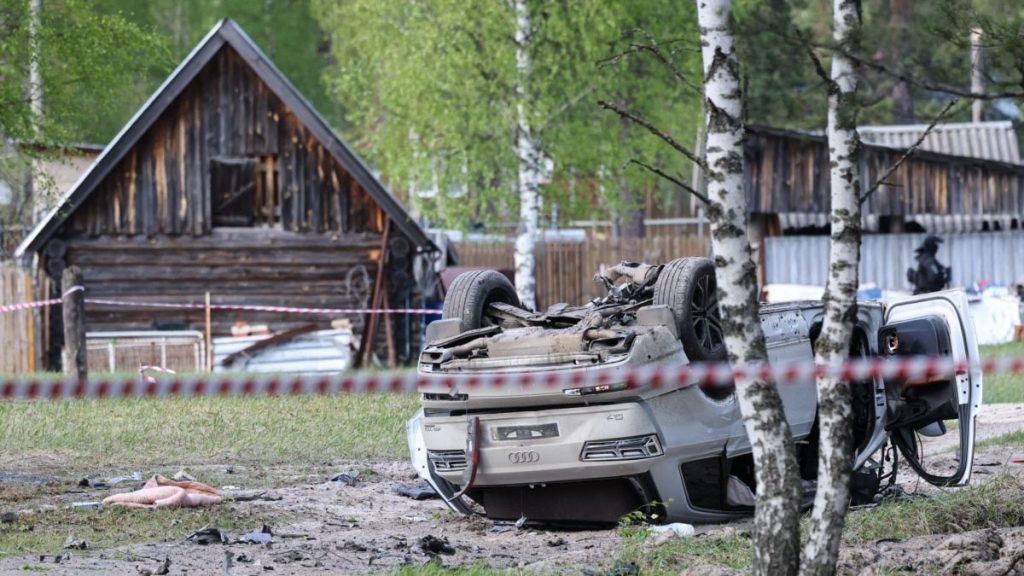
On Saturday, May 6, near Nizhny Novgorod, the car of a former deputy of the State Duma of the Russian Federation and a well-known propagandist Yevgeny Prilepin, better known under the pseudonym Zakhar Prilepin, was blown up. Naturally, this news resonated and caused heated discussions in Russia and Ukraine. At the same time, despite statements about the critical condition of Prilepin, already on May 7, a post was published on his official telegram channel on his behalf, in which he spoke about his state of health and shed light on the situation with the car explosion.
Timeline:
- After the car explosion, information appeared in the Russian media that Prilepin’s daughter was in the car with Prilepin. At the time of the blast, the girl had already managed to get out of the car, unloading things; she was not injured.
- A spokesman for Zakhar Prilepin immediately after the incident stated that “what exactly happened has not been established at the moment. Zakhar Prilepin is fine.”
- Later, it became known that Prilepin’s driver died on the spot, and the passenger (i.e. Prilepin) received severe leg injuries.
- It also became known that Prilepin was returning to Moscow from the territory of the self-proclaimed “LDNR”.
- The Investigative Committee of the Russian Federation named the name of the suspect in the attempt on Prilepin – Alexander Permyakov. The suspect was immediately detained, and during the interrogation, he stated that he “acted on the instructions of the special services of Ukraine.”
- The governor of the Nizhny Novgorod region, Yevgeny Nikitin, said that after the assassination attempt on Prilepin, he was put into an artificial coma. Then, according to him, Prilepin was operated on and put into a drug-induced sleep to recover from his injuries quickly.
- The SBU commented on the assassination attempt on Prilepin: “Officially, we can neither confirm nor refute the involvement of the SBU in this or that “bavovna” [a linguistic joke: in Ukrainian, “bavovna” stands for the Russian name of “cotton” (“khlopok”), a homonym for a word “explosion” – ed.] that happens to the occupiers and their henchmen.” At the same time, the press service recalled that the head of the SBU, Vasily Malyuk, had repeatedly noted that for the Russians, who brought war, loss of life and violence to Ukrainian soil, “the bavovna burned, burns and will burn.”
- Sometime later, the radical partisan organisation Atesh claimed responsibility for the assassination attempt on Prilepin.
- Later, a second suspect in the attempt on Prilepin’s life was detained by the police. He was found while checking the forest belt near the crime scene.
- Already in the next day’s evening, a new entry on his behalf appeared in Zakhar Prilepin’s official telegram channel. In it, he told some details of what happened: “My dear person, who worked as my guardian angel for eight years, died. Sasha “Evil” Shubin. Fearless soldier and friend and brother. They just gave me a phone. There is some confusion in the media. Sasha rode on the right in the passenger seat. I was driving. The explosion happened under his wheel. He also confirmed that he dropped his daughter off five minutes before the explosion.
Outcomes and outlook:
Itself, the action aimed at killing Zakhar Prilepin looks like another sabotage carried out by the Ukrainian special services. Prilepin took an extremely anti-Ukrainian position and had his supporters, including among the creative intelligentsia. Based on Prilepin’s novel “Abode”, a feature series was filmed in Russia, in which Sergei Bezrukov played one of the leading roles. True, if earlier Prilepin looked somewhat caricatured and grotesque, he turns into a cult figure after the explosion.
Notably, the explosion of Prilepin’s car was immediately overgrown with several shortcomings and confusion. Information about the state of Prilepin himself differed. At the same time, despite the statements of the governor of the Nizhny Novgorod region about introducing Prilepin into an artificial coma, by the evening of the next day, he published his first post on the telegram channel. Of course, there is no reason to talk about a staged terrorist attack (at least, currently, Ascolta does not have enough information), while several questions remain open.
It doesn’t matter who organized the explosion – Ukrainian or Russian special services. What is essential is that Prilepin is brought to the political plane. In the last parliamentary elections in Russia, he became a deputy of the State Duma and co-chairman of the “Just Russia – For Truth” faction. Now he will gradually take over the functions of the leader of this inter-party association, sending the uncharismatic and inexpressive Sergei Mironov into political oblivion.
Rumours about a possible unification of “A Just Russia – For Truth” with the Communist Party and the Liberal Democratic Party, with the subsequent formation of a single “party of war”, are being confirmed. Prilepin can become the face of this association, which can nominate and support Yevgeny Prigozhin for the presidency of the Russian Federation in the March 2024 elections. We are dealing with the creation of a new political field in the Russian Federation, a new political reality in which – no matter how strange it may seem – Putin will be destined for the role of a “dove” and a “peacemaker”, who will have to win the electoral struggle of Prigozhin, the representative of the “war party.” Several months of staged battles should convince the West that “it’s better to forgive Putin and deal with an understandable president” than “to allow fascists to come to power in Russia.”
- Interview of the Secretary of the Security Council of the Russian Federation Nikolai Patrushev to the publication “Izvestia”
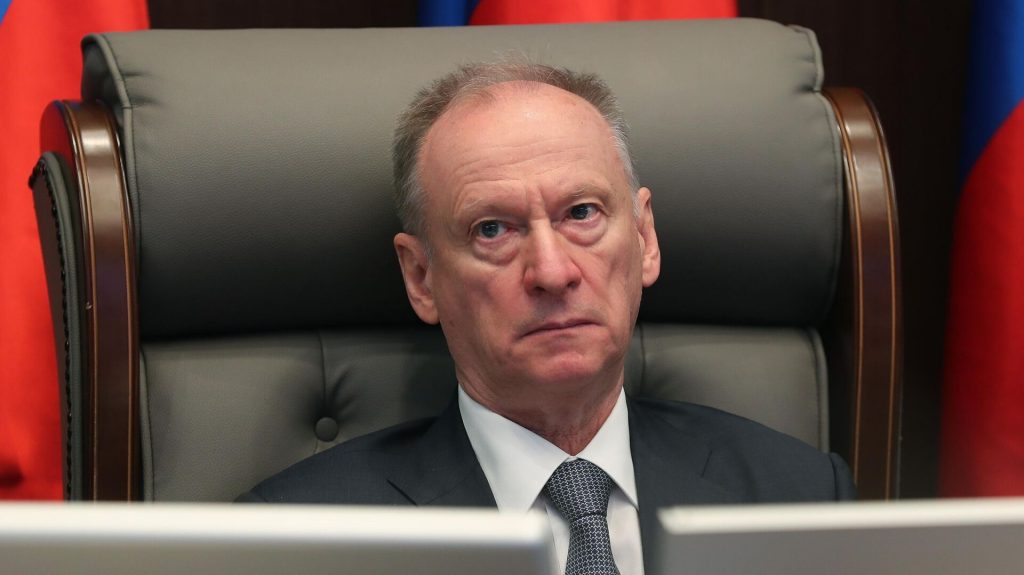
On Wednesday, May 3, an interview was published by the Secretary of the Security Council of the Russian Federation, Nikolai Patrushev, to Izvestia. In it, he talked about the hushing of Russia’s role in the victory over fascism, Western theories of economic dominance and the subjugation of Europe to the United States. Patrushev also said that “the Americans need Ukraine only because of its natural resources, and they need the country without a traditional population. That is why the war between the West and Russia goes on to the last Ukrainian.”
Key theses:
- “An actual outcome of the Second World War was the formation of the United Nations. The Soviet Union played a crucial role in its creation and occupied one of the leading positions there.
- “Attempts to distort the history of the Second World War began in the West even before its last shots had died down. Already in the early stages of the conflict in England, they tried to publish a collection of false documents to lay the primary blame for the outbreak of war in Europe on the Soviet Union.
- “There are many irrefutable facts about how representatives of the Anglo-Saxon elite shared fascist ideas, supported Hitler financially and organizationally, and today they need to maintain a “democratic” face.”
- “Even NATO’s eastward expansion follows the same directions as Napoleon, Kaiser Wilhelm and Hitler.”
- “European politics today is in the most profound moral and intellectual decline. A striking example is the Munich Security Conference, where Western politicians gather only to read each other State Department manuals.
- “Having created the mechanisms of the North Atlantic Alliance for their own needs, the USA occupied Europe. Put in a position of hopelessness, European officials have turned the Old World into an economic base for American experiments, dutifully fulfilling NATO’s military tasks.
- “Falsely declaring the importance of combating terrorism, the West is actively using terrorist and extremist organisations against Russia, using the same methods it used in the 1990s in the North Caucasus.”
- “An English proverb says, ‘People who live in glass houses shouldn’t throw stones.’ Washington, which decides the fate of other states and peoples, should remember that the ancient Romans lived well in Pompeii and did not shy away from debauchery.
- “FYI: Over the past year, the number of US citizens who have obtained passports from other countries has tripled. The myth of the notorious “American dream” has been dispelled. Today, the States have slipped into the Middle Ages. The US authorities silently look at the atrocities of radical individuals and force citizens to bow before BLM activists. A real witch hunt can be called the growing persecution of media representatives. Over the past two years, more than 300 attacks on correspondents have been committed in the United States. Dozens of journalists have been arrested and convicted only for carrying out their professional duties, preparing reports on topics that the authorities prefer to keep silent about.”
- “Ukraine is required by Americans only as an object of ruthless exploitation of available natural resources without a traditional population. Yet, following such a neo-Nazi line, Washington has already turned it into a territory that millions of people are leaving en masse, seeking protection abroad from socio-economic problems and pro-fascist oppression.
Outcomes and outlook:
This is not the first time Nikolai Patrushev has presented such a theses. However, the fact that lately, Patrushev has been trying to distance himself from many topics is striking and thus shows himself to be a constructive “arbiter” in domestic political processes.
He prefers to speak on history, geopolitics, and foreign policy. Still, he does not assess domestic political issues, although they are no less the subject of close attention of the Security Council of the Russian Federation. It is also essential that Patrushev only briefly touches on issues related to the so-called “SMO” of the Russian Federation against Ukraine. He tries to be “above the fray”; the interview demonstrates that Patrushev is “with the president, and not on the side of Shoigu, Kovalchukov, Sechin, Chemezov or anyone else. With all the enormous amount of information presented in the interview, this is precisely its central leitmotif.
Also, as in previous interviews, Patrushev continues to accentuate the theses about the militarisation of the West, which is gradually becoming a conditional “hotbed of terrorism.” Such a concept entirely fits into the overall strategy of a dependent “anti-Western coalition”, trying to demonstrate the peacekeeping intentions of Beijing and its satellites. Patrushev is trying in every possible way to play directly to the Chinese audience, thus showing the main goals facing his department and, apparently, the entire Russian government.

